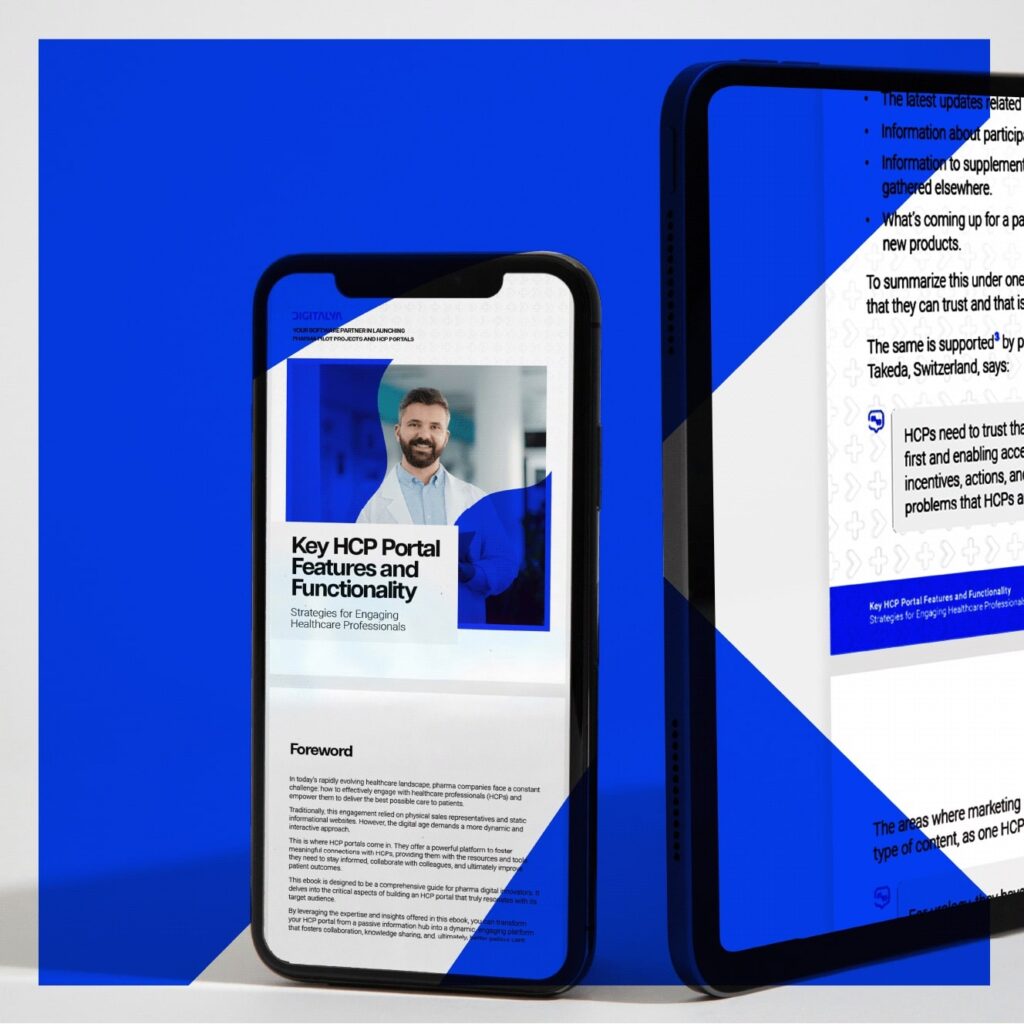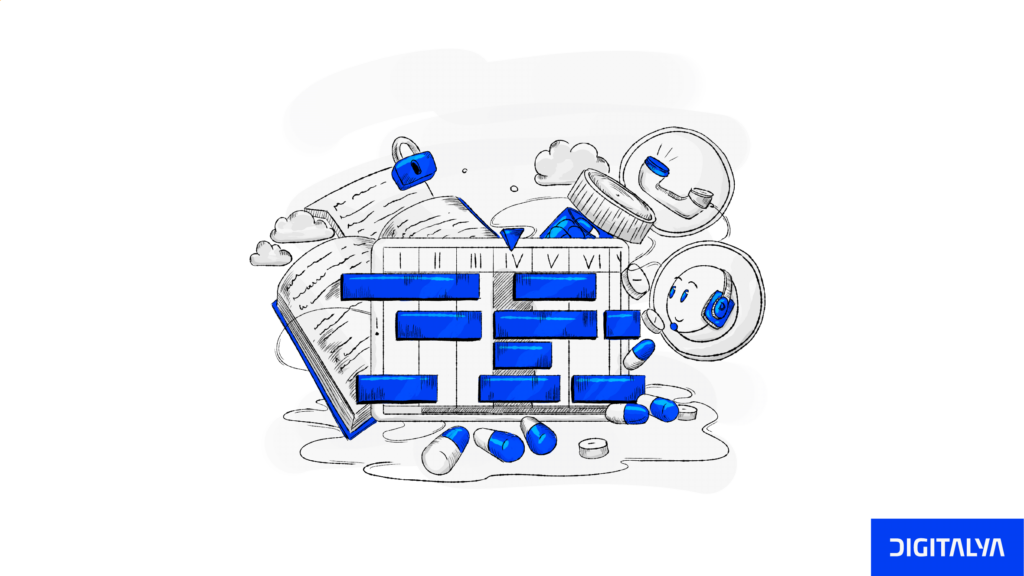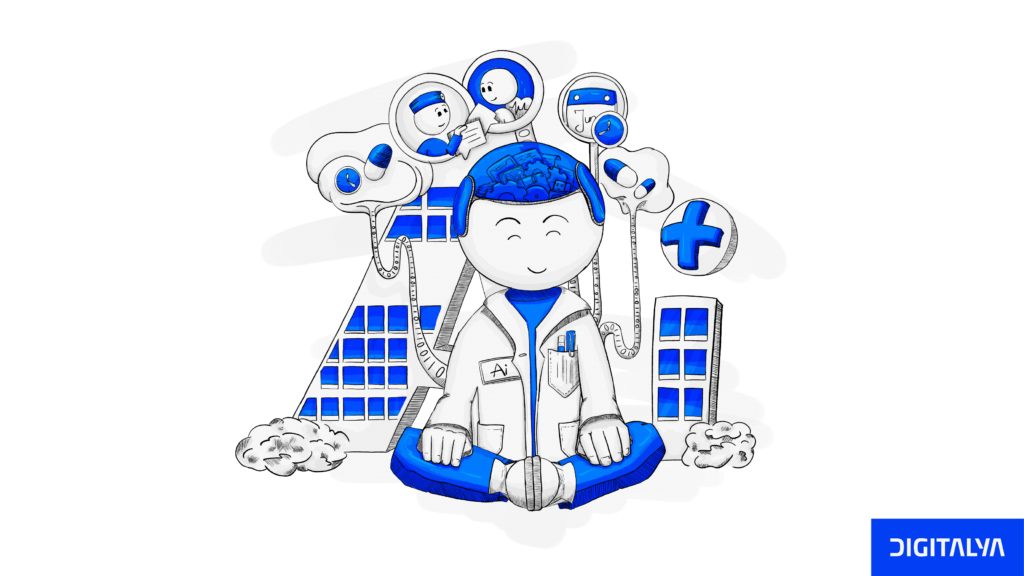Well-built HCP Portals are a cost-effective way of communication – but there are other benefits. There are many types of HCP Portals, each with its own benefits and drawbacks, but all of them will include clinical data and medical studies, disease information, and therapeutic strategies. But let’s not get ahead of ourselves and start from the beginning.
1. What are HCP Portals?
Long story short, HCP Portals (Healthcare Professional Portals) are online resources healthcare professionals use to get informed and clinical trials and studies.
These portals are designed explicitly for healthcare providers — a secure and convenient way for them to access different resources and tools related to patient care, medical information, research, and collaboration.
Also named HCP website, this type of platform can be accessed only by healthcare professionals, not the general public. Some of them are made by a pharma brand, and some are more generic and medical — their objective is to engage, inform, and educate.
To understand better, let’s take a look at some common features and functionalities you can find in HCP Portals:
Patient data and records
A lot of HCP Portals provide access to patient data, personal information, and electronic health records (EHRs). Healthcare providers can review or update the data, track medical history, and even manage treatment plans.
Communication and collaboration
This great tool facilitates the connection between healthcare providers through secure messaging, forums, and even real-time video conferencing. This allows HCPs to exchange information, share knowledge or ask for a second opinion.
Research and clinical trials
Healthcare professionals can access the results of a clinical trial or a research study. This allows them to explore research opportunities, contribute to advancing medical knowledge, or even participate in clinical trials.
Practice management
Some HCP Portals can include tools for practice management, like appointment scheduling, billing, or electronic prescribing. Those are a great way of streamlining administrative tasks and have an impact on the effectiveness of healthcare staff.
Decision Support Tools
With a direct impact on patient care, some portals provide features like clinical calculators, checkers for drug interaction, and even diagnostic assistance. With these functionalities, HCPs make informed decisions that can lead to better patient outcomes and treatment plans.
Medical information
A common feature of HCP Portals is providing access to various medical resources, from clinical guidelines, drug databases, research articles, and medical journals to reference materials. These digital resources make staying up-to-date with the latest discoveries, best practices, and medical knowledge more accessible.
Continuing medical education
Another frequent feature, HCPs can access CME opportunities through these portals, like online courses, webinars, or conferences. By doing this, they earn credits and continuously improve their knowledge and skills in different areas.
The features and functionalities of an HCP Portal can vary according to the pharmaceutical companies or organizations that operate the portal. Different healthcare systems or institutions can have their own tailored portals according to their needs and requirements.
2. Why are HCP portals important for modern healthcare?
HCP Portals can greatly support delivering better experiences for health care providers and any healthcare organization. Using a portal offers you a scalable way to respond to various requests in a compliant manner while reducing the strain of individually taking care of each request.
Additionally, a portal allows customization of the user experience for different roles, from physicians to nurses and pharmacists. A user-focused approach can offer insight into product needs, the effectiveness of digital marketing campaigns, or new audiences for different treatments or medications.
Some studies show that 80% of customers say that the experience a company provides is as important as the services and products it offers, and 57% of respondents have stopped buying from an organization because a competitor provided a better experience. This also applies to the relationship between healthcare professionals and a pharma company.
Let’s take a look at the four main reasons why HCP Portals are essential for modern healthcare:
2.1 Improved communication and collaboration
Exchanging information and sharing ideas between healthcare professionals is necessary for efficient operations, patient safety, and the quality of care delivery. However, achieving efficient communication can be pretty tricky in some organizations. In a survey conducted by Sermo, health professionals were asked about the most common blockers for communication with others:
- 57% answered delays in receiving information (like patient records),
- 15% said technical issues,
- 9% blamed a lack of incident response,
- 8% mentioned outdated technology,
- 6% picked compliance risk,
- 3% answered other.
Patient information has to be shared promptly to improve patient outcomes. Additionally, 68% of the physicians that answered in the previous survey said that they communicate at least once a week with healthcare professionals from other facilities. So how can HCP Portals help?
1. Secure messaging
This is a prevalent feature. It allows healthcare professionals to communicate and collaborate within a private environment. This means they can share patient information, discuss challenging cases or rare diseases, seek second opinions, and share knowledge compliantly without compromising confidentiality.
2. Referrals and transitions of care
HCP Portals can streamline the process of referrals and care transitions. Physicians have the possibility to initiate or track referrals, share patient data securely, and communicate efficiently with the receiving healthcare providers. This way, smooth transitions can be ensured, and the continuity of care can be improved.
3. Discussion forums
Just like regular forums, they foster collaboration, encourage data sharing, and even promote a sense of community. This encourages professional discussions, insight sharing, asking questions, and seeking advice from other healthcare providers.
4. Expert consultations and second opinions
Due to the security of this type of portal, physicians are encouraged to seek expert advice or second opinions from their peers. This is especially useful with complex cases or rare diseases.
5. Real-time video conferencing
Some HCP Portals offer video conferencing capabilities. This enables physicians to conduct virtual meetings, multidisciplinary discussions, and even remote consultations. Facilitating face-to-face interactions enhances communication regardless of geographical barriers.
6. Document sharing and collaboration
Care plans, treatments, lab results, and reports can be shared securely through an HCP Portal. This facilitates real-time collaboration and team-based collaboration. Access to this information without delay leads to a coordinated and holistic approach to care.
There are a lot of features and functionalities that can facilitate communication and collaboration between healthcare professionals. However, the bottom line is that HCP portals can lead to better-informed decisions, improved patient outcomes, and enhanced care coordination.
2.2 Increased efficiency and productivity
Besides improving communication and collaboration, another benefit of using HCP portals is a noticeable increase in operational efficiency and productivity. Optimizing workflows allows healthcare professionals to focus more on patients and delivering care than administrative operations.
Continuing medical education
As we mentioned before, HCP portals often provide access to learning opportunities, online courses, webinars, and conferences. Physicians can access these resources conveniently in one place, through the portal, without stepping away from practice. Online CME provides an opportunity for healthcare providers to continuously enhance their skills and knowledge, keeping them up to date with advancements in their field.
Centralized access to information
These portals can act as a centralized platform where healthcare providers can access various research articles, clinical guidelines, reference materials, and anything related to medical information. Therefore, providers can conveniently access the information they need instead of spending endless hours on research or searching through physical documents.
Patient data access
On the same note, HCP portals provide physicians with a secure way of accessing patient data and electronic health records. This facilitates the provider’s access to information about the patient and can lead to better-informed decisions, fewer errors, and improved care coordination.
Streamlined workflows
HCP portals often integrate with other healthcare systems, like EHRs, appointment scheduling, and billing systems. This integration streamlines workflows, eliminating manual data entry and automating administrative tasks.
What should be remembered is that HCP portals leverage efficiency-enhancing features. This way, they streamline workflows, improve communication and access to information, and support continuous learning.
2.3 Enhanced patient care and engagement
Even though HCP portals are aimed at healthcare professionals, they can significantly impact patient care. On this note, they have patient-centered features that empower patients and encourage them to engage in their care.
As mentioned before, the centralized access to patient data and personal health information, as well as streamlining administrative workflows, allows physicians to allocate more time to communicating directly with their patients and engaging with them.
Additionally, having research materials and clinical reports easily accessible in one place makes it easier for healthcare professionals to stay up-to-date with the latest discoveries in their field. Also, this facilitates communication between patients and their doctors since it’s easier for providers to reach out and better explain their treatments, leading to a better customer experience.
2.4 Improved data collection analysis
Health care involves a diversified set of data collection systems, ranging from health surveys to billing and medical records. These are used by various institutions, like hospitals, physicians, and community health centers. HCP portals can help reduce the fragmentation of data flow, improve data analysis, and enable organizations to gain valuable insights.
Standardized data capture
HCP portals provide structured templates and forms for data entry. This makes sure that there is standardization and consistency in the collection of healthcare data. This way, essential information is captured uniformly, facilitating data analysis and comparison across different providers and settings.
Data security and privacy,
Especially in the healthcare domain, data security and privacy are prioritized. HCP portals implement robust security measures, like encryption, audit trails, and access controls, ensuring the confidentiality and integrity of patient data. This will encourage professionals to trust the platform and contribute to the data collection efforts.
Comprehensive data collection
These portals enable the collection of a wide variety of data points, ranging from patient demographics to medical history, diagnoses, treatment plans, and outcomes. Because of this, HCP portals enable a thorough analysis and facilitate the identification of patterns, trends, and correlations.
Research and quality improvement initiatives
On the same note as above, HCP portals support research and quality improvement initiatives. This is done by streamlining data collection for research studies or clinical trials. Portals can be used to collect and analyze data, identify areas for improvement, and even drive evidence-based practices.
Analytics and reporting tools
More often than not, a common feature of HCP portals is built-in analytics and reporting tools. These allow healthcare providers to extract, analyze, and visualize data, enhancing the comprehension of complex information and facilitating data-driven decision-making.
The enhancements enable physicians and healthcare organizations to gain valuable insights, improve decision-making, drive research, and even enhance the quality of care delivery.
3. What are some challenges and limitations for HCP portals?
Even though HCP portals come with numerous benefits, they have their challenges, just like anything else. For instance, user adoption — resistance to change, limited technological proficiency, or time constraints can be a massive challenge for the adoption of this technology.
Additionally, user experience is paramount — this means that the portal’s interface can make or break the whole thing. It’s vital to ensure that the portals are user-friendly, easy to navigate, and optimized for any device.
Other challenges include the importance of data security and privacy for these portals, technical infrastructure and reliability, maintenance and updates, and even interoperability. The bottom line is that every key feature an HCP portal has needs to be done right — otherwise, it becomes a considerable disadvantage.
These tools can be optimized by actively addressing these limitations to deliver their intended benefits and improve healthcare delivery.
4. Conclusion
Despite having challenges and limitations, HCP Portals is a tool that can bring healthcare delivery to another level. From enhancing communication and collaboration to increasing efficiency and productivity among healthcare professionals, this technology is something that you want on your side.






